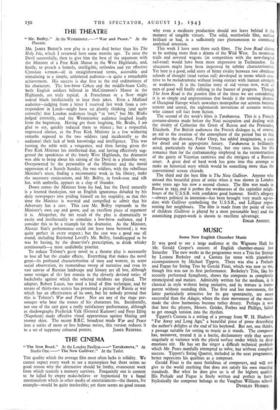THE CINEMA
THE quality which the .average film most often lacks is solidity. We cannot expect every week to see a masterpiece but there seems no good reason why the alternative should be frothy, evanescent work from which scarcely a memory survives. Frequently one is content to be lulled by empty make-believe or hypnotised by a banal emotionalism which in other media of entertainment—the theatre, for example—would be quite intolerable; yet there seems no good reason
why even a mediocre production should not leave behind it the memory of tangible virtues. The solid, worthwhile film, neither brilliant or bad, is a sufficiently rare phenomenon to command analytical attention.
This week I have seen three such films. The Iron Road claims to be nothing more than a drama of the Wild West. Its mountain trails and covered wagons (in competition with the newfangled rail-road) would have been more impressive in Technicolor. Its situations might have been improved by subtler characterisation. Yet here is a good, solid story of bitter rivalry between two obstinate schools of thought (road versus rail) developed in terms which con- trive to be melodramatic without losing contact with human strength or weakness. It is the familiar story of old versus new, with ail men of good will finally rallying to the banner of progress. Though The Iron Road is the poorest film of the three we are considering it is so simple and unpretentious that beside it the teeming dramas of Occupied Europe which nowadays monopolise our screens become remote and unreal, the nightmarish inventions of scenario writers who cannot tell fact from fiction.
The second of the week's films is Tarakanova. This is a French costume-drama made before the Nazi occupation and dealing with the rivalry of Catherine the Great of Russia and the Pretender, Elizabeth. For British audiences the French dialogue is, of course, an aid to the creation of the atmosphere of the period but to this advantage the director, Fedor Ozep, has added imagination, a care for detail and an appropriate luxury. Tarakanova is brilliantly acted, particularly by Annie Vernay, but one cares less for the romance than for the craftsmanship employed in the reconstruction of the gaiety of Venetian carnivals and the intrigues of a Russian court. A great deal of hard work has gone into this attempt to make an historical story which would be something more than the conventional screen charade.
The third and the best film is The New Gulliver. Anyone who missed this beautiful piece of satire when it was shown in London ' some years ago has now a second chance. The film was made in Russia in 1935.and it probes the weaknesses of the capitalist neigh- bours of the U.S.S.R. with confident good humour. Swift's allegory —always political in intention—has been brought very much up-to- date with Gulliver symbolising the U.S.S.R., and Lilliput repre- senting her neighbours. The film is made from the point of view of children (Gulliver is played by a most personable boy) and the astonishing puppet-work is shown. to excellent advantage.
EDGAR ANSTEY.






















 Previous page
Previous page